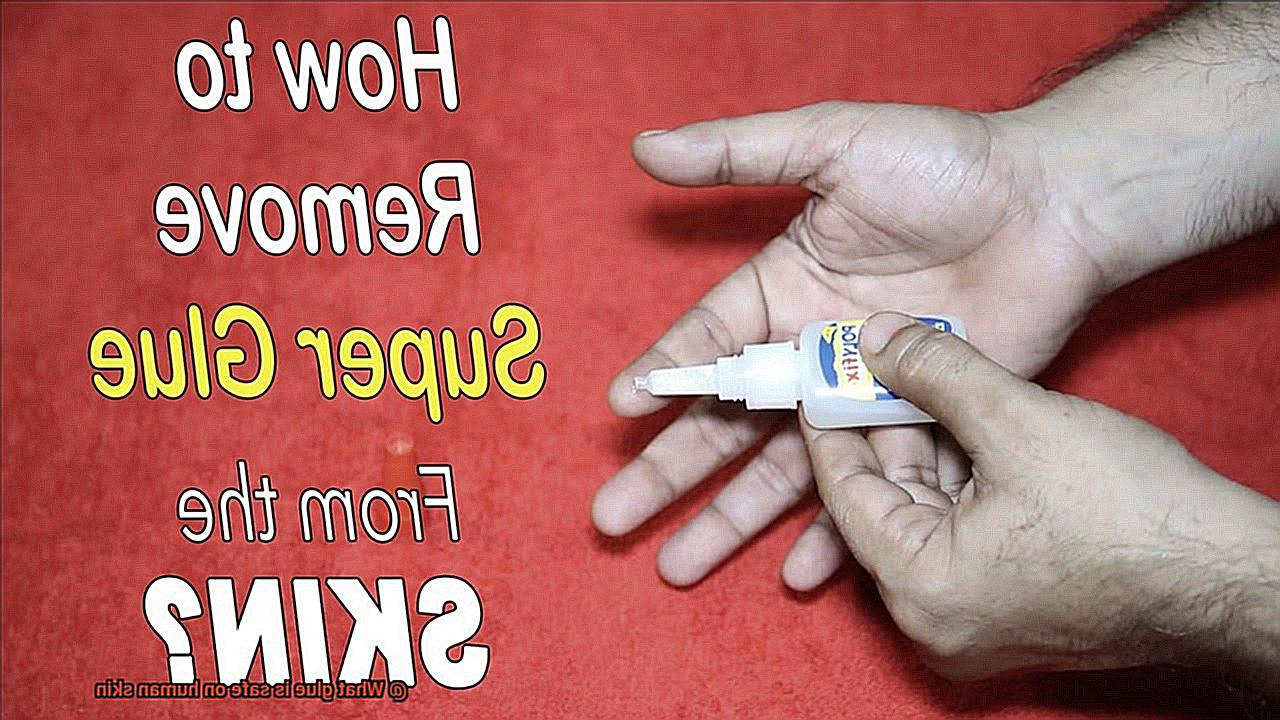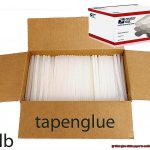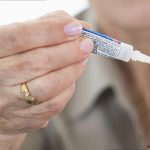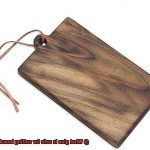The unsung hero of DIY projects and quick fixes. But what about when you need to stick something on your skin? You can’t just slap any old adhesive on there and hope for the best. Don’t worry, my friend, we’ve got your back. Today, we’re diving headfirst into the world of glues that are safe to use on human skin. Whether you’re patching up a little boo-boo or trying to keep your bling in place, we’ve got all the juicy details. Just remember, safety always takes center stage when it comes to experimenting with glue and skin.
Now, before we get carried away dreaming of adhesive wonders, let’s talk about the types of glue that are considered safe for skin application. While there isn’t one magical glue that fits all situations (bummer, I know), there are some options specifically designed for our delicate epidermis. Medical adhesives like liquid skin adhesive or medical-grade cyanoacrylate (super glue) are formulated with our precious skin in mind. These bad boys provide a strong bond without being toxic or irritating to our dermis.
But hold your horses. Even with these relatively safe options, caution is key. Stay away from industrial or household glues like they’re a grumpy porcupine – they can contain nasty chemicals that might make your skin throw a tantrum. Always perform a patch test on a small area before going all-in with any adhesive on your skin. And if anything funky happens (like redness, swelling, or an uncontrollable urge to do the Macarena), seek medical attention ASAP.
Now that we’ve covered the basics, let’s talk about how to safely apply glue to your precious flesh canvas. First things first – clean and dry is the name of the game. Make sure your skin is squeaky clean and free of oils or dirt.
A gentle cleanser and a good ol’ pat-dry with a clean towel should do the trick. When it’s go-time, apply a thin layer of glue using a cotton swab or disposable applicator for ultimate precision. And here’s a pro tip: once that glue is in place, don’t even think about repositioning it.
Trust me, moving it around will only lead to skin irritation and potential damage.
Now, let’s get one thing straight – glue on skin is best
Types of Glues Safe for Skin Application
Contents
Glue is a versatile adhesive that can be used for various purposes, from crafting to medical procedures. However, when it comes to using glue on your skin, safety should always be the top priority. Not all glues are suitable or safe for direct contact with the skin, as they can cause irritation or allergic reactions.
Here, we will explore the different types of glues that are considered safe for skin application.
Medical Adhesive or Surgical Glue:
One type of glue that is safe for skin application is medical adhesive or surgical glue. This specialized adhesive is specifically designed for use on the skin and is commonly used in medical procedures, such as closing wounds or attaching medical devices. Medical adhesive is formulated to be non-toxic and hypoallergenic, reducing the risk of skin irritation or allergic reactions. It provides a secure and durable bond while allowing the skin to breathe and heal properly.
Cosmetic Adhesive:
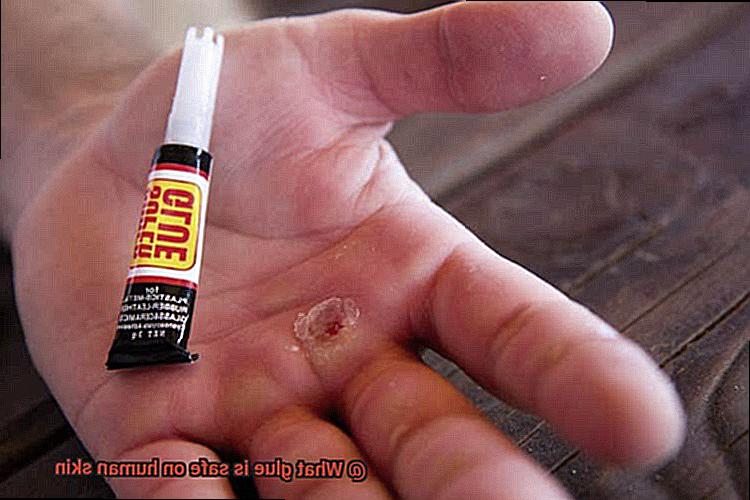
Cosmetic adhesive is another type of glue that is safe for skin application. It is widely used in the beauty industry for attaching false eyelashes, prosthetics, or other cosmetic enhancements. These adhesives are carefully formulated to be gentle on the skin and are often latex-free to reduce the risk of allergies. They provide a strong and long-lasting hold without causing any harm or damage to the delicate skin around the eyes or other facial areas.
Craft Glues:
Some craft glues, such as fabric glue or tacky glue, can be safe for temporary adhesive purposes on the skin. These glues are often used in special events or costumes to attach small decorations or accessories. However, it’s important to test a small patch of skin before applying these glues more extensively to ensure no adverse reactions occur. Additionally, it’s crucial to remove these glues from the skin as soon as they are no longer needed, as prolonged exposure can cause skin irritation or damage.
Eyelash Adhesive:
Eyelash adhesive is specifically formulated to be used on the delicate skin around the eyes and is designed to hold false eyelashes in place. It is typically made from non-toxic ingredients and is safe for use on the skin. Eyelash adhesive provides a strong and reliable hold for extended periods without causing any discomfort or harm to the skin or eyes.
Liquid Latex:
Liquid latex is a natural rubber-based adhesive commonly used for special effects makeup and body art. It can be applied directly to the skin and dries to create a flexible and durable bond. Liquid latex is often used to create prosthetics, scars, and other special effects on the skin. However, it’s important to note that some individuals may have latex allergies, so it’s crucial to perform a patch test before using liquid latex extensively.
When using glue on your skin, it’s important to choose a glue that is specifically designed for skin application. Whether it’s medical adhesive, cosmetic adhesive, or craft glue, always read the label and follow the instructions provided by the manufacturer.
Additionally, perform a patch test on a small area of skin before applying any adhesive more extensively to ensure no adverse reactions occur.
Medical Grade Adhesives
In this enlightening discourse, we shall delve into the safety considerations and distinctive properties of these adhesives, revealing why they reign supreme in the realm of medicine.
Let us begin with safety, the paramount concern when it comes to medical grade adhesives. Meticulously formulated, these glues are non-toxic and non-irritating to the delicate human skin. Undergoing rigorous testing and adhering to stringent regulatory standards, their biocompatibility is assured. Thus, fret not when applying them to your precious skin – wounds closed, bandages applied, or surgical procedures undergone – these adhesives have your safety in mind.
Yet, safety is not the sole virtue that distinguishes medical grade adhesives. These extraordinary glues possess an array of unique properties, rendering them perfect for human skin applications. Gentle yet sturdy, they ensure secure adhesion, keeping wounds tightly sealed and medical devices steadfastly affixed.
Moreover, their flexibility and conformability enable them to adhere flawlessly to curved or irregular surfaces without a hint of discomfort or impeding your movement.
So whether you’re twirling about or merely going about your daily activities, rest easy knowing these adhesives will cater to your every need.
And cleanliness? Fear not, for medical grade adhesives undergo meticulous sterilization processes. This ensures their resolute freedom from any microorganisms that might otherwise sow the seeds of infection. In surgical procedures, where cleanliness reigns supreme, these adhesives stand as beacons of purity. Trust in their immaculate nature and let your worries dissipate like smoke.
Cosmetic Adhesive
The secret lies in the world of cosmetic adhesive. These magical glues are the unsung heroes behind flawless makeup applications and mind-blowing transformations. Get ready to dive into the captivating realm of cosmetic adhesive and discover why it’s a game-changer for your beauty routine.
Safety First:
Not all glues are created equal when it comes to adhesives. Household glues like super glue or craft glue should never touch your precious skin. They can cause serious irritation, discomfort, or even damage. That’s why it’s crucial to choose adhesives specifically designed for skin use. Look for labels like “cosmetic adhesive” or “skin-safe adhesive” to ensure you’re making a safe choice.

Ingredients that Soothe:
Cosmetic adhesives are made from medical-grade ingredients that prioritize your skin’s well-being. These gentle formulas minimize the risk of irritation or allergic reactions. From acrylic polymers and silicone derivatives to water-based wonders and natural gum-based adhesives like latex, there’s an adhesive out there that suits your needs.
Choose wisely, and you can enjoy stunning makeup looks or special effects without any worries.
Staying Power:
One of the primary reasons for using cosmetic adhesive is to ensure that your makeup or prosthetics stay in place for hours on end. Whether you’re rocking fabulous false eyelashes or creating gory wounds for a theatrical masterpiece, a good adhesive provides reliable and long-lasting support. Say goodbye to smudging or slipping mishaps and hello to confidence that lasts all day (or night) long.
Patch Test for Peace of Mind:
Before applying any new adhesive to a larger area of your skin, it’s essential to perform a patch test. This simple step involves applying a small amount of adhesive on a discreet area and observing for any adverse reactions. Redness, itching, or swelling could indicate an allergy or sensitivity. By patch testing, you can ensure that the adhesive is suitable for your skin and avoid any unwanted surprises.
Household Glues
These versatile adhesives are the unsung heroes of our DIY projects, repairs, and even beauty routines. However, when it comes to using glue on human skin, safety should always be our top priority. In this article, we will delve into the various types of household glues and explore the important safety considerations when applying them to our precious skin.
Super Glue: The Bonding Beast
Super glue, also known as cyanoacrylate adhesive, is renowned for its powerful bonding properties. However, direct application on the skin is a big no-no. When exposed to moisture like sweat or natural oils, it can quickly bond and cause irritation or even burns. Avoid using super glue on open wounds or sensitive areas.
Craft Glue: Unleash Your Creativity Responsibly
Craft glues are commonly used in DIY projects involving paper, fabric, and other materials. While most craft glues are safe for skin application when dry, it’s crucial to read the instructions and warnings provided by the manufacturer. Some craft glues may contain chemicals that trigger skin irritation or allergic reactions. Perform a patch test before applying craft glue on larger areas.
White Glue: The Trusty Companion
White glue, also known as school glue or PVA glue, is a non-toxic adhesive frequently used in arts and crafts. Once completely dry, it is generally safe for skin application. However, excessive use or prolonged exposure may lead to dryness or peeling. Remember to wash off any residual glue after use.
Medical Adhesive: Healing with Care
Medical adhesives are specially formulated to be safe for skin application. Widely used in hospitals and clinics for wound closure and securing medical devices, these adhesives prioritize gentle bonding while minimizing skin irritation or damage. Follow healthcare professionals’ instructions when using medical adhesives.
Skin-Safe Adhesives: Beauty’s Best Friends
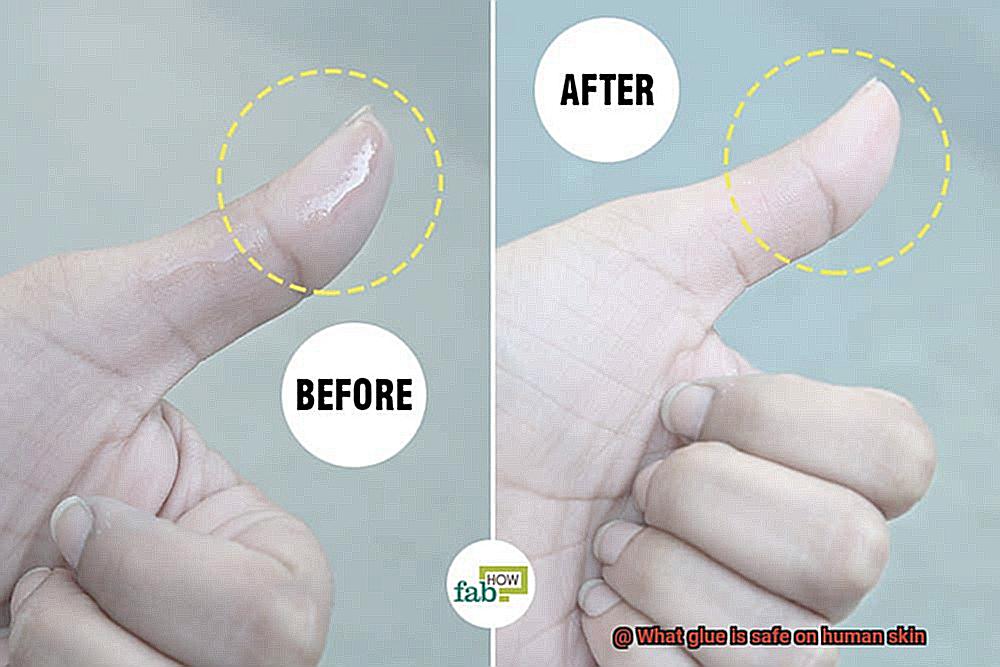
The beauty industry offers a range of adhesive products designed specifically for skin application. These adhesives are perfect for attaching false eyelashes, body jewelry, or prosthetics. They are formulated to be gentle on the skin, providing a secure bond without causing harm or irritation. Always read and follow the instructions carefully.
Types of Glue to Avoid on Human Skin
When it comes to using glue on human skin, caution is key. Not all glues are safe for direct contact with the skin and can cause irritation, burns, or even allergic reactions. In this article, we will explore five types of glue that should be avoided when applying directly to human skin, ensuring the safety and well-being of your skin.
Cyanoacrylate Glue (Superglue):
Cyanoacrylate glue, more commonly known as superglue, should never come in contact with human skin. This adhesive bonds quickly and strongly, making it unsuitable for skin application. Applying superglue directly to the skin can lead to painful irritation, burns, and potentially severe allergic reactions. Save this powerful adhesive for non-porous materials like metal or plastic, where its strength can be harnessed effectively.
Epoxy Glue:
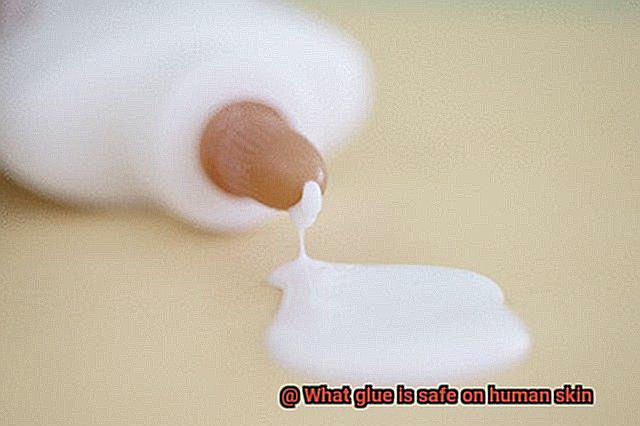
While epoxy glue is a popular choice for various applications, it is not safe for direct contact with the skin. This strong adhesive contains harsh chemicals that can cause skin irritation, rashes, and burns. It is better suited for bonding surfaces such as wood, ceramics, or metals. Protect your skin by avoiding the use of epoxy glue on it.
Contact Cement:
Contact cement is known for its strong bonding capabilities, but it should never be applied directly to human skin. This adhesive contains solvents that can be harmful and lead to skin irritation or even chemical burns. While contact cement may work well for joining materials like laminate or leather, it is not suitable for application on your precious skin.
Hot Glue:

Hot glue guns are a staple in crafting projects, but they should never be used directly on human skin. The high temperature of the glue can cause severe burns and damage to the delicate skin. Additionally, hot glue does not adhere well to the skin and can easily peel off, making it an ineffective choice for skin application. Keep your skin safe by avoiding the use of hot glue on it.
Industrial-Strength Adhesives:
Industrial-strength adhesives, such as construction adhesives or polyurethane glues, should be strictly avoided when it comes to the skin. These powerful glues are designed for heavy-duty applications and contain strong chemicals that can cause skin irritation, burns, and allergic reactions. Protect your skin’s health by steering clear of these industrial-strength adhesives.
Removing Unsafe Glue from the Skin
Unsafe glue on the skin can be a frustrating and uncomfortable experience. Whether it’s accidental spills, adhesive residue, or a failed attempt at a DIY project, getting rid of unsafe glue from the skin is important for both health and aesthetic reasons. One of the most common types of unsafe glue on the skin is super glue, which contains cyanoacrylate that forms a strong bond when it comes into contact with moisture. However, there are safe and effective methods to remove super glue from the skin without causing harm.
- Soaking in warm soapy water: This method involves soaking the affected area in warm soapy water. The warmth helps soften the glue, while the soap acts as a lubricant. Gently massage the area to encourage the glue to loosen its grip on the skin. After a few minutes of soaking, use a soft cloth or sponge to gently rub away the glue.
- Acetone or nail polish remover: Acetone is a strong solvent that can break down cyanoacrylate bonds. Apply a small amount of acetone onto a cotton ball or pad and gently dab it onto the glue. Avoid getting acetone on any open wounds or cuts as it can cause irritation. Slowly rub the affected area until the glue starts to dissolve.
- Natural remedies: If you prefer natural options, olive oil or coconut oil can be effective in removing super glue from the skin. These oils work by breaking down the adhesive properties of the glue. Apply a small amount of oil onto the affected area and gently massage it in. Let it sit for a few minutes, then use a cloth or paper towel to wipe away the softened glue.
It is important to note that acetone should not be used on sensitive areas of the skin, such as near the eyes or mucous membranes. If super glue gets in these areas, it is recommended to seek medical attention immediately. Additionally, if none of these methods work or if the glue is particularly stubborn, it may be necessary to consult a healthcare professional who has access to specialized products and techniques for safe glue removal.
Safety First: Consulting with a Professional
Using glue on human skin can be a tricky task, as not all glues are created equal. The potential risks associated with using the wrong type of glue can range from mild irritation to severe allergic reactions. That’s why it’s crucial to consult with a professional before you embark on any skin glue adventures. In this article, we will explore the importance of seeking expert advice and how it can help ensure your safety when using glue on human skin.
Understanding the Different Types of Glue:
When it comes to using glue on human skin, it is essential to know which type is safe and suitable. Professionals can guide you through this maze by explaining the properties of different glues and recommending the ones that are specifically formulated for skin use. This knowledge empowers you to make informed decisions about which glue is best suited for your needs.
Identifying Potential Risks:
Consulting with a professional, such as a dermatologist or a medical expert, allows you to fully understand the potential risks associated with certain glues. They can inform you about the presence of harmful chemicals or irritants in certain products and advise against their use on your skin. By being aware of these risks, you can make an informed decision and avoid any unnecessary harm.
Proper Application Techniques:
Using glue on human skin requires precise application techniques to ensure maximum safety and effectiveness. Professionals can provide valuable guidance on how to apply the glue correctly, avoiding sensitive areas or open wounds. They can also recommend proper adhesive removal methods to prevent any damage to your skin. By following these techniques, you minimize the risk of accidents or complications during the application process.
Allergic Reactions and Sensitivity:
Everyone’s skin is unique, and what works for one person may not work for another. Professionals can assess your skin type and sensitivity, helping you choose a glue that minimizes the risk of allergic reactions or irritation. They can also provide advice on how to identify and manage any adverse reactions that may occur. This personalized approach ensures that you are using a glue that is compatible with your skin, reducing the likelihood of unpleasant side effects.
Exploring Alternative Options:
In some cases, using glue on human skin may not be the best option. Professionals can suggest alternative products or techniques that are specifically designed for skin use. For instance, medical-grade adhesives are extensively tested and approved for safe application on human skin. By exploring these alternatives, you can find a solution that meets your needs while prioritizing your safety. Consulting with a professional opens up possibilities and ensures that you are considering all available options.
vDLrxILRwfA” >
Also Read: Is Glue Bad For Your Skin?
Conclusion
When it comes to finding a glue that is safe for human skin, there are a few options to consider.
One popular choice is medical adhesive, which is specifically designed for use on the body. This type of glue is often used in hospitals and clinics for wound closures and surgical procedures.
Another option is eyelash glue, which is formulated to be gentle on the delicate skin around the eyes. It’s important to read the labels and choose a glue that explicitly states it is safe for skin contact.
Avoid using superglue or other strong adhesives, as they can cause irritation and damage to the skin.

